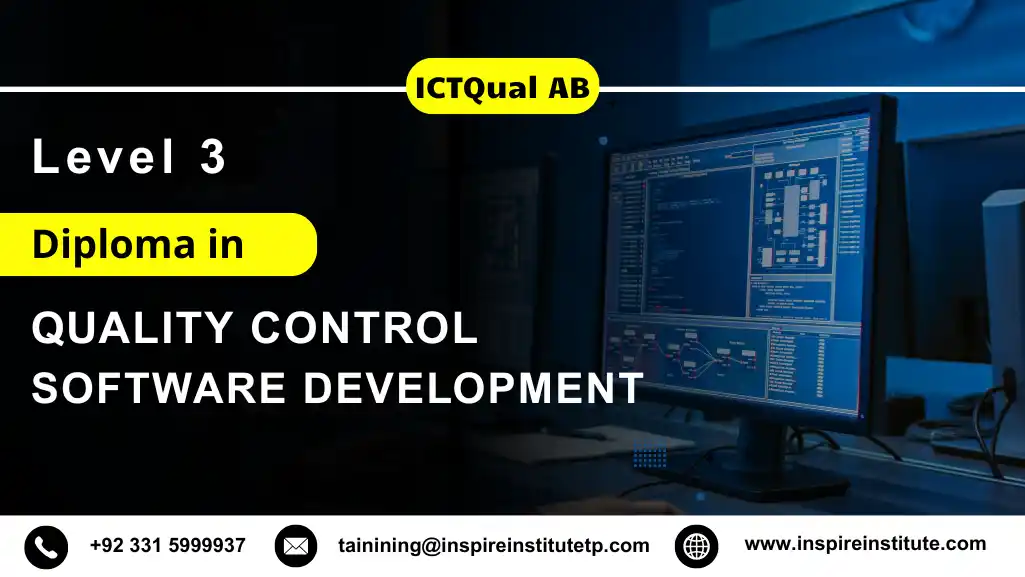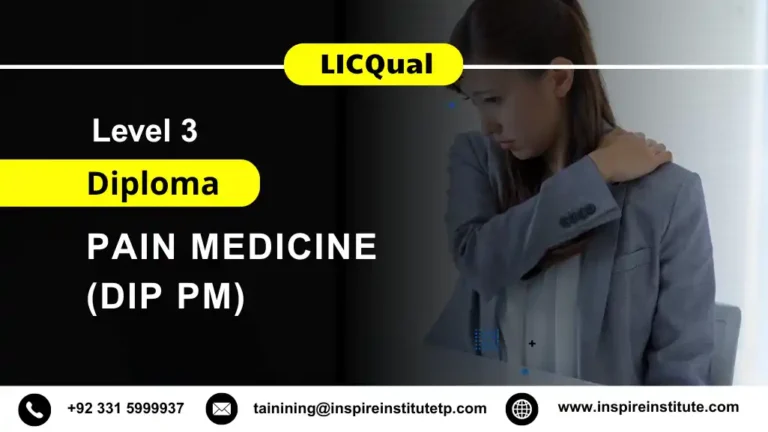ICTQual AB Level 3 Diploma in Quality Control Software Development
The ICTQual AB Level 3 Diploma in Quality Control Software Development is a specialist qualification designed for individuals aiming to develop a strong foundation in software quality assurance, testing methodologies, and compliance standards. This course equips learners with the essential skills to ensure software products meet industry benchmarks, functional requirements, and user expectations. This ICTQual AB Level 3 Diploma in Quality Control Software Development provides comprehensive training in the principles and practices of quality control within software development environments. Learners explore testing processes, defect management, performance monitoring, and compliance with global software standards.
The ICTQual AB Level 3 Diploma in Quality Control in Software Development supports learners in becoming valuable contributors to software teams, ensuring that technology products meet the highest standards of performance, usability, and compliance. The ICTQual AB Level 3 Diploma in Quality Control Software Development is Ideal for individuals beginning their careers in software development or quality assurance, this qualification blends theoretical concepts with hands-on practice to prepare learners for real-world environments. It also lays a strong foundation for further studies and certifications in software quality engineering, software development, or IT project management.
Why Choose this Qualification
Choosing the ICTQual AB Level 3 Diploma in Quality Control Software Development is an excellent step for individuals seeking to build a solid foundation in software quality assurance and testing. Below are key reasons to consider this qualification:
Industry-Relevant Curriculum: The course is specifically designed to address the fundamental quality control needs of the software development industry, aligning with widely accepted testing standards and best practices.
Practical Skill Development: Learners gain hands-on experience in essential testing techniques, defect identification, and quality documentation, preparing them for real-world software quality challenges.
Career Entry and Growth: This diploma enhances employability by equipping learners with the knowledge and skills required for roles such as software tester, QA analyst, or junior quality control officer.
Professional Recognition: The qualification is recognised by employers and training providers across the UK and internationally, boosting your professional credibility.
Pathway to Further Learning: It provides a strong foundation for progression to higher-level ICTQual diplomas or specialised certifications in software development and quality assurance.
By completing this ICTQual AB Level 3 Diploma in Quality Control Software Development, you will be well-prepared to contribute effectively to software quality processes, helping organisations deliver reliable and high-performing software products.
Course Overview
Awarding body : ICTQual AB
Course Level: 3
Credits : 30
Study Units: 6 Units
Evidence & Assignment Based
Qualification Structure
This qualification, the ICTQual AB Level 3 Diploma in Quality Control Software Development, consists of 6 mandatory units.
- Fundamentals of Software Quality Assurance
- Software Development Life Cycle (SDLC) and Testing Methods
- Defect Tracking and Reporting Systems
- Functional and Non-Functional Testing Techniques
- Test Planning and Execution
- QA Documentation and Compliance Standards
Who Should Take This Course
The ICTQual AB Level 3 Diploma in Quality Control Software Development is suited for individuals who want to build foundational skills in software quality assurance and testing. This qualification is ideal for:
Aspiring Software Testers and QA Professionals: Those looking to start a career in software testing, quality assurance, or software auditing.
Junior Software Developers: Developers who want to deepen their understanding of quality control to improve the reliability and performance of their code.
IT Support and Technical Staff: Professionals seeking to broaden their knowledge of software testing processes and defect management.
Students and Graduates: Individuals interested in entering the software development sector with a focus on quality and testing.
Career Changers: Those transitioning into IT or software development who want an entry-level qualification to enhance their employability.
This ICTQual AB Level 3 Diploma in Quality Control Software Development provides a practical and theoretical foundation that prepares learners for various entry-level roles within software quality control and testing.
Course Benefits
Enrolling in the ICTQual AB Level 3 Diploma in Quality Control Software Development offers numerous advantages for both your professional skills and career development:
Foundational Knowledge: Gain essential understanding of software quality control principles, testing methodologies, and defect management.
Practical Experience: Develop hands-on skills through real-world testing scenarios and quality assurance practices that enhance your technical competence.
Improved Employability: Obtain a recognised qualification that demonstrates your commitment and capability in software quality assurance, making you more attractive to employers.
Career Progression: Build a solid foundation for advancing into specialised roles such as software tester, QA analyst, or junior quality control officer.
Alignment with Industry Standards: Learn processes and techniques in accordance with recognised software quality frameworks, preparing you to meet industry expectations.
Flexible Learning Options: Designed to suit learners with varying levels of experience, including those balancing work and study commitments.
This ICTQual AB Level 3 Diploma in Quality Control Software Development equips you with the knowledge and skills necessary to contribute effectively to software development teams, helping organisations deliver reliable and high-quality software products.
Eligibility Criteria
To enrol in the ICTQual AB Level 3 Diploma in Quality Control Software Development, candidates should meet the following requirements:
Minimum Age: Applicants must be at least 16 years old at the time of enrolment.
Educational Background: While there are no strict academic prerequisites, a basic understanding of software development, IT, or related subjects is recommended to benefit fully from the course.
Work Experience: No formal work experience is required, making this qualification accessible for beginners and those new to software quality control.
Language Proficiency: Candidates should have a good command of English, both written and spoken, to understand course materials and successfully complete assessments.
The Qualification Process
The ICTQual AB Level 3 Diploma in Quality Control Software Development follows a structured and learner-friendly qualification process that blends academic study with real-world coaching skills. The process is designed to develop competent, ethical, and client-focused health coaches who are capable of supporting others in achieving sustainable lifestyle changes. Below is an overview of the key stages in the qualification journey:
• Admission and Enrolment
Learners begin by applying through an approved ICTQual AB training provider, where they must:
• Submit proof of identity and academic qualifications (typically Level 3 or equivalent)
• Demonstrate proficiency in English (e.g., IELTS 5.5 or equivalent)
• Complete a personal statement or interview (where required) to assess interest in health and wellness coaching
Once approved, learners are formally enrolled and given access to course resources.
• Course Orientation
New learners receive a full orientation that includes:
• An introduction to the course structure, units, and learning outcomes
• Guidelines on assignments, deadlines, and tutor support
• Information about coaching practice expectations and ethical conduct
• Programme Delivery
The course is delivered through a flexible format, which may include:
• Online, blended, or classroom-based learning
• Interactive webinars and tutorials
• Independent reading and research
• Practical exercises and case studies
This delivery style supports learners in balancing their studies with work or personal commitments.
• Core Areas of Study
Learners explore a broad and practice-driven curriculum, including:
• Foundations of health coaching and behaviour change
• Goal setting and action planning
• Motivational interviewing and communication strategies
• Health promotion and wellness concepts
• Coaching ethics and professional boundaries
• Reflective practice and personal development
• Coaching Practice
Though not always mandatory, learners are encouraged to:
• Apply coaching tools in real or simulated sessions
• Record and reflect on client progress
• Gather feedback to improve coaching performance
Some training centres may also include practical assessments, role-plays, or coaching portfolios.
• Assignments and Assessments
Assessment is based entirely on coursework. Learners are required to:
• Complete written assignments, reflective journals, and coaching session plans
• Submit case studies and progress reports
• Demonstrate understanding of theory through practical application
• Present evidence of learning in a structured portfolio
• Tutor Support and Feedback
Throughout the course, learners benefit from:
• One-on-one academic guidance
• Regular tutor feedback on assignments
• Coaching supervision or mentorship (depending on provider)
• Access to learning platforms and study materials
• Internal and External Quality Assurance
All assessments are:
• Internally verified by the training provider
• Externally quality-assured by ICTQual AB to ensure fair grading and regulatory compliance
This two-tier system maintains the academic integrity and credibility of the qualification.
• Certification
Upon successful completion of all course units and submission of required evidence, learners are awarded the ICTQual AB Level 3 Diploma in Quality Control Software Development.
• Post-Qualification Progression
Graduates of this diploma can:
• Begin or advance a career as a Quality Control Software Development
• Work in private practice, community health programmes, or corporate wellness
• Progress to higher-level coaching or health-related qualifications
• Seek accreditation with national or international coaching bodies (subject to additional requirements)
This structured process ensures learners graduate with the practical confidence, professional standards, and academic grounding needed to thrive as ethical and effective health practitioners in a growing global wellness industry.







